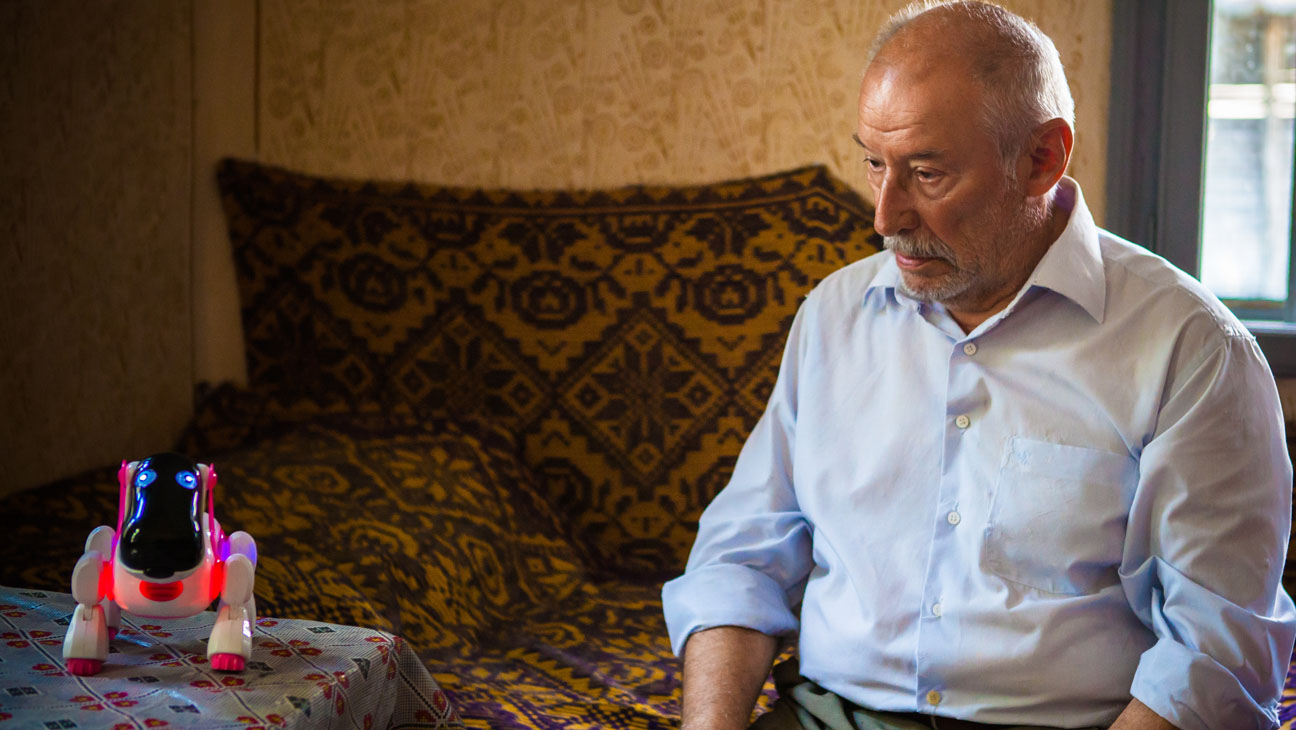By Chlotrudis Independent Film Society
Rating: 4.5 cats
Director: Tudor Cristian Jurgiu

Original language title: Câinele Japonez
Country: romania
Year: 2015
Running time: 86
IMDB: http://www.imdb.com/title/tt3223280/combined
Kyle says: “THE JAPANESE DOG is yet another outstanding film from what cineastes refer to as either the Romanian New Wave or the New Romanian Cinema. The title refers to a plastic toy dog that waddles, flashes lights, talks ‘baby talk’, and sings ‘Twinkle Twinkle Little Star’ in English. It becomes a symbol of familial reconnection after an older Romanian man named Costache Moldu (Victor Rebengluc), the recent victim of a flood that destroyed his home and killed his wife, spends his time rebuilding, while offers are made to purchase his land, and he is visited by his estranged son Ticu (Serban Pavlu), with his Japanese wife Hiroko (Kana Hashimoto) and young son Koji (Toma Hashimoto). To use the phrase ‘deceptively simple’ to describe this film may evoke works such as Yasujiro Ozu’s LATE SPRING (1949). While the rituals of family life and the small awkwardnesses of reconciliation are beautifully portrayed, there is no clear resolution as to whether familial reunion has resulted, or whether Costache will simply travel to Japan to visit Ticu’s family, return to finish rebuilding and continue his solitary life. The narrative richness is in the transitory nature of the lives observed. Particularly noteworthy is an exquisite panoramic opening long shot of workers cleaning up debris and looking through receding flood pools for reusable items, which the director says he and his cinematographer happened upon accidentally during their location scouting. By chance I met director Jurgiu in the Walter Reade lobby and could not resist the temptation to say that virtually all the Romanian films we see here are of an unusually high quality, suggesting that everything in the New Romanian Cinema is excellent. He responded, ‘Oh, you don’t see all the bad Romanian films here in America!’ 4 cats
“Seen Friday, March 21, 2014, New Directors/New Films at the Walter Reade Theater, Film Society of Lincoln Center, New York.”
Bruce says: “A breathtaking tableau opens THE JAPANESE DOG, one reminiscent of the peasant paintings of Pieter Breugel the Elder. Peasants are sifting through the mud flats of a flood plain in hope of finding their belongings that disappeared when a flash flood destroyed their village homes. One such man is Costache (Victor Rebengiuc). Hard to read at first, the septuagenarian may be senile, weary or perhaps merely disillusioned. Costache is currently living in an abandoned home once stately, now in ruins.
“Since the details of his life are revealed ever so slowly it takes time to put the many pieces together, some of which are never perfectly clear. For example, we learn that Costache has a son Ticu (Serban Pavlu) who now lives in Japan and a wife named Maria who has recently died. Whether Maria died from disease, was washed away by the flood, or died of natural causes is never understood. Gabi, Ticu’s former fiancée who he left in the lurch without a word when he left for Japan, runs the local post office. Fond of Costache she delivers a letter addressed to Maria from Japan. Next is a call from Japan at the mayor’s office; Ticu is returning to Romania.
“Ticu arrives with his Japanese wife Hiroku (Kana Hashimoto) and son Koji (Toma Hashimoto). Their presence is both a strain and a blessing. ‘Why didn’t you say anything?’ Ticu asks his father when he learns of his mother’s death. ‘I didn’t know how, son,’ he replies. Later Costache tells Ticu, ‘you messed up Gabi. Why did you propose to her if you were leaving?’ indicating that what initially may be perceived as a generation gap may be something entirely different, perhaps a universal inability to face difficult truths or learned behavior within a given family structure.
“While Costache and Ticu wrestle with father and son bonding issues, Costache forms a strong attachment to his grandson. They play games and enjoy the pastoral serenity of the countryside. Ticu invites his father to Japan but is somewhat rebuffed. Koji gives his grandfather one of his prized possessions as a token of his love, a robot dog that sings, ‘Twinkle, Twinkle, Little Star’ in English.
“Costache is offered a sizable sum for the land he lost. His initial instinct is to give it to Ticu for when he returns to his homeland. ‘Dad, I live there.’ Ticu says with finality. (That Romania is also physically changing director Jurgiu reveals through contrast. Giant tractors patrol the food washed plain next to horses drawing handmade carts.)
“THE JAPANESE DOG has been compared favorably to the works of Ozu and there are striking similarities in the way THE JAPANESE DOG carefully examines the human condition revealing the pleasant surprises and seemingly unavoidable foibles in the ways we communicate with one another and the ways in which we choose to deal with the passing of time. 5 cats”
